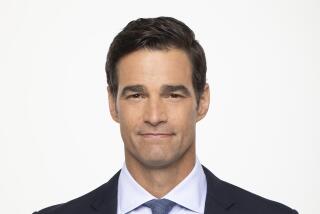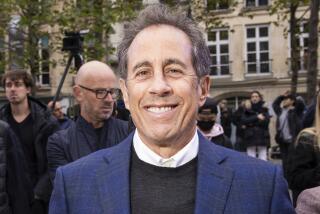Influential Public Television Programmer Leaves Post
The executive who oversaw the Corporation for Public Broadcasting’s $70-million television programming fund has left after three years to return to filmmaking.
Michael Pack, the corporation’s senior vice president for television programming, said he decided to exercise an option in his contract that allowed him to collect a $500,000 grant for a documentary called “Winning Modern Wars” that his production company was awarded before he took the job at CPB in February 2003. The film will explore how the military is adapting to fight terrorism and other threats.
Pack’s use of the grant was frozen for three years when he accepted the CPB post. He had to exercise the option by Monday or he would lose the money.
“I always knew I was coming here for a brief amount of time,” Pack said in an interview Friday. “Since I always planned to return to independent production ... it made sense to leave with a grant intact.”
His last day was Friday. John Prizer, vice president of program development, will take over Pack’s responsibilities until the corporation names his permanent successor.
Pack had one of the most influential posts at the corporation, a private nonprofit that distributes federal funding to public broadcasters. As head of television programming, he had the ability to green-light programs that relied on CPB for funding.
He also launched two high-profile grant programs: America at a Crossroads, which is financing 20 documentaries about the changes in the U.S. since the Sept. 11 attacks, and the American History and Civics Initiative, which will fund projects that use innovative technology to teach middle and high school students about history and politics.
Corporation President Patricia Harrison, who asked Pack to stay on, praised his work. “Michael has created two innovative initiatives, and we are totally committed to both of them,” she said.
Pack had been viewed with wariness by some public broadcasting advocates, who feared he had a political agenda. During his tenure, Pack developed public affairs programs that featured conservative commentator Tucker Carlson and the editorial board of the Wall Street Journal. At the time, Kenneth Y. Tomlinson, who was then the chairman of the CPB board, was agitating against what he said was a liberal bias in noncommercial television.
Pack, who declined to discuss his political views, said he merely sought to expand the perspectives within public broadcasting. He noted that the films receiving funding from the America at a Crossroads initiative reflected a variety of viewpoints, from arguments that the Bush administration had undermined civil liberties to examinations of the neoconservative case for American interventionism.
“One of CPB’s goals always is to ensure there is a diversity of views,” he said. “I think most people looking at my record would say that it was to the betterment of public broadcasting.”
More to Read
The biggest entertainment stories
Get our big stories about Hollywood, film, television, music, arts, culture and more right in your inbox as soon as they publish.
You may occasionally receive promotional content from the Los Angeles Times.






